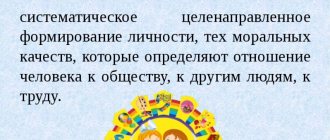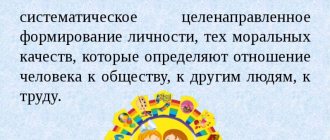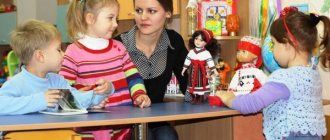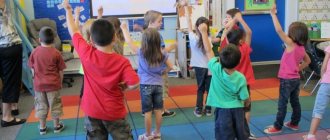CHILDHOOD GUIDE
From work experience
“Civic-patriotic education of preschool children”
Zubekhina Anna Evgenievna,
Kryukova Tamara Alexandrovna,
teachers of MBOU secondary school No. 165, preschool department,
Novosibirsk city
“Just like a small tree that barely rises above the ground, a caring gardener strengthens the root, on the power of which the life of the plant depends for several decades, so a teacher should take care of instilling in his children a feeling of boundless love for the Motherland.”
Vasily Alexandrovich Sukhomlinsky
The problem of patriotic education of the younger generation is one of the most pressing . Patriotic education of preschoolers is not only the education of love for one’s home, family, kindergarten, city, native nature, the cultural heritage of one’s people, one’s nation, and a tolerant attitude towards representatives of other nationalities, but also the education of a respectful attitude towards the worker and the results of his work, native land, defenders of the Fatherland, state symbols, state traditions and national holidays.
In the Russian education system, a special culture of support and assistance to the child, family, and teachers in the educational process is developing - psychological and pedagogical support. The concept of modernization of Russian education defines priority tasks, the solution of which requires the construction of an adequate system of psychological and pedagogical support. One of these tasks is the patriotic education of the younger generation.
The federal educational standard for preschool education sets goals for patriotic education : creating conditions for the formation of the foundations of patriotic consciousness of children, the possibility of positive socialization of the child, his comprehensive personal, moral and cognitive development, development of initiative and creativity based on types of activities appropriate for preschool age.
The content of the Federal State Educational Standard notes the urgent need to intensify the process of instilling patriotism in preschoolers. Children at this age are very inquisitive, responsive, and receptive. They easily respond to all initiatives and are able to sincerely sympathize and empathize. For the educator, this is a time of fertile soil. Indeed, at this age great opportunities arise for the systematic and consistent moral education of children. The formation of the child’s spiritual foundation, emotions, feelings, thinking, processes of social adaptation in society takes place, and the process of realizing oneself in the world around us begins. It is this period of a person’s life that is most favorable for the emotional and psychological impact on a child, since his images are very bright and strong, and therefore they remain in memory for a long time, and sometimes for a lifetime, which is very important in the education of patriotism.
Patriotic education of a child is the basis for the formation of a future citizen. Patriotism is love for the Motherland, devotion to one’s Fatherland, the desire to serve its interests and readiness, even to the point of self-sacrifice, to defend it.
are known : love for the Motherland begins with an attitude towards the closest people - father, mother, grandfather, grandmother, with love for one's home, the street on which the child lives, kindergarten, school, city.
The main tasks of patriotic education of preschool children:
- formation of love for the native land (involvement in one’s home, family, kindergarten, city);
— formation of spiritual and moral relations;
— formation of love for the cultural heritage of one’s people;
- nurturing a love of respect for one’s national characteristics;
— self-esteem as a representative of one’s people;
- a tolerant attitude towards representatives of other nationalities, peers, parents, neighbors, and other people.
System of work on patriotic education of children:
- Familiarization with the objects of the immediate environment: - fostering respect for working people and objects of folk art, artistic crafts;
— fostering respect for working people and the objects they produce;
— acquaintance with people who glorified Russia;
- fostering a sense of friendship towards people of other nationalities.
- Familiarization with the phenomena of public life: - nurturing a sense of belonging to the life of the country (patriotic dates and holidays);
- a thrifty attitude towards what is made by people; - nurturing love for the native land, for the Motherland (idea of the country, cities, capital, symbols of the state;
— acquaintance with the sights of the city, architectural monuments, and the names of streets bearing the names of famous people;
— acquaintance with the events taking place in the country, expanding ideas about the country, the capital, and the symbols of the state.
- Familiarization with nature: - nurturing love for the nature of the native land; - fostering a caring attitude towards native nature; — fostering a sense of the need for labor participation in the protection of native nature.
Forms of work on patriotic education:
— creation of a developing environment for civic and patriotic education;
— thematic classes;
— project activities;
- conversations about the Motherland, about the hometown, about the nature of the native land, about good people, reading children's books on patriotic themes, an appropriate selection of songs and poems for learning, watching movies, television programs for children, purposeful games;
— interaction with parents;
- interaction with society.
Work on patriotic education in our preschool:
.
Education of moral and patriotic feelings in preschool children through familiarization with their native nature Musical and patriotic education of preschool children Patriotic education of children of senior preschool age through the project method Spiritual and moral education of preschool children >
Civic-patriotic education at school
In a comprehensive school, this process becomes purposeful, morally conditioned and complex. It prepares students for life, for interaction, work and full functioning of the individual in society, for participation in the social life of the state. Forms a sense of responsibility for one’s moral and legal choices (including political ones), for the development of one’s abilities and achievements of life goals.
As you can see, the goals of education are global, which is why the state educational system pays so much attention to civic education.
Work on civic-patriotic education in school is carried out throughout the entire educational process. It is planned during the organization of educational activities, classroom (in lessons and during class hours) and extracurricular work in accordance with the stated curriculum.
Program for civic and patriotic education of schoolchildren
The program highlights its goals and objectives as a priority area in the education system as a whole. The content of the program sets out the ideas that determine the orientation, values and other components of the students' civic position.
The goal of the program is to create conditions for the development of the personality of a future citizen - a patriot of his homeland, the formation of his moral values, views, attitudes, and motives for activity.
Program objectives:
- Forming in students a sense of responsibility, a strong civic position, and a desire for self-improvement;
- Improving the quality of conditions for the implementation of civic-patriotic education;
- Development of its forms and methods using new technologies;
- Fostering tolerance among students towards representatives of other nationalities;
- Formation of a sense of civic duty;
- Formation of patriotic feelings towards the Motherland, love for one’s culture, a sense of pride in the history, traditions and achievements of one’s people.
Civic-patriotic education is divided into three age stages, each of which has its own methods and characteristics.
| Age stages | Methods |
| Primary School |
|
| Middle management |
|
| Senior classes |
|
Patriotic education in preschool educational institutions
Activities for civic and patriotic education at school
Work on civic education at school is not carried out separately, on its own, but in full interaction with the educational process and extracurricular activities. The tasks of civic education are implemented in educational activities (in history, literature, native language, music, visual arts lessons) and in extracurricular activities. These events are planned both by each teacher individually and by the entire school system as a whole:
- Thematic classroom hours;
- Social studies course;
- Excursions to the school museum and city museums;
- Studying family history and family traditions;
- Studying the history of one’s people, traditions and customs characteristic of the area where students live;
- Work of local history, military-patriotic and other circles;
- Meetings with WWII veterans and combatants (in hot spots);
- Excursions to Russian cities;
- School events, concerts, competitions organized throughout the year.
Centers for civic and patriotic education
The problem of civic patriotic education is so important and global that its implementation is a priority for the state. To help schools and families, volunteer centers for civic and patriotic education for children and youth are being opened in cities and regions. Increasingly, young people, students, and teenagers are taking the initiative into their own hands, realizing their role in the future of our country.
The purpose of such centers:
- Introduction of additional programs with a socio-pedagogical focus;
- Implementation of artistic programs in the field of decorative and applied arts;
- Legal regulation of work on patriotic education of children and youth;
- Organization of “patronage” of military units over educational institutions within the framework of military-patriotic education;
- Methodological support of special programs for patriotic education implemented by teachers in schools and preschool educational institutions, introduction of special forms, methods and means of educational work into their activities.



